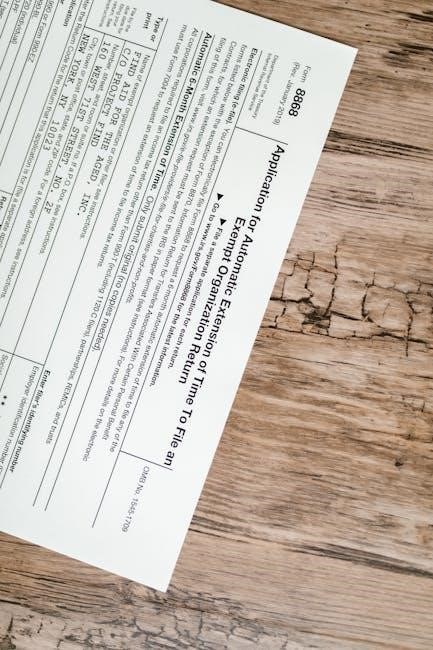Overview of Sixth Form Application Deadlines 2024
Deadlines for sixth form applications vary across institutions, with some requiring submissions by November 2023. Missing these deadlines can result in limited course availability or rejection. Ensure timely preparation to secure your preferred options and avoid last-minute complications.
1.1 Importance of Meeting Deadlines
Meeting sixth form application deadlines is crucial to secure your place in desired courses. Late submissions often result in limited course availability or rejection. Many institutions prioritize timely applicants, reducing opportunities for those who miss deadlines. Additionally, some colleges may not offer interviews or assessments to late applicants, further narrowing chances. Submitting applications on time demonstrates responsibility and commitment, traits valued by admissions teams. Failing to meet deadlines can jeopardize academic plans, emphasizing the need for careful planning and adherence to submission timelines to ensure a smooth transition to sixth form.
1.2 Variations in Deadlines Across Institutions
Application deadlines for sixth forms in 2024 vary significantly between institutions. Some schools and colleges set earlier deadlines, such as late November, while others may extend into December or January. Private schools often have standardized timelines, while state schools may align with local authority deadlines. International students or those applying to selective institutions may face stricter or earlier cutoffs. Additionally, some colleges offer rolling admissions, processing applications as they arrive. It’s essential to check individual institution websites for specific deadlines, as missing them can lead to lost opportunities or delayed processing of applications.
1.3 Consequences of Missing the Deadline
Missing the sixth form application deadline can have significant consequences. Many institutions prioritize timely applicants, leaving late submissions with limited course availability. Some schools may not consider late applications at all, especially for popular subjects. This could force students to reconsider their options or delay their education. Additionally, missing deadlines may affect eligibility for scholarships or bursaries. In extreme cases, it could lead to a gap year or alternative educational paths. It’s crucial to adhere to deadlines to ensure a smooth transition and maintain academic momentum.
Key Deadlines for Sixth Form Applications in 2024
The main deadline for sixth form applications is typically in October or November 2023, with late applications often accepted in early 2024. Check specific institution timelines.
2.1 Main Application Deadline
The main application deadline for sixth form applications in 2024 typically falls in October or November 2023. This is a critical cutoff, as missing it may limit course availability or result in rejection. Applicants should confirm exact dates with their chosen institutions, as timelines can vary. Ensure all required documents and personal statements are prepared in advance to meet this deadline. Proper planning is essential to secure your preferred courses and avoid last-minute complications. Late submissions are often accepted but may not guarantee placement in popular subjects. Always verify specific institution requirements to avoid delays.
2.2 Late Application Deadlines
Some institutions accept late applications after the main deadline, but options may be limited. Late applicants risk missing out on popular courses or having fewer subject choices. Deadlines for late applications vary, often falling between December 2023 and January 2024. Students are advised to check specific institution timelines, as policies differ. Late submissions may require additional steps, such as interviews or assessments, to secure a place. International students should also be aware of earlier deadlines for visa processes. Missing the main deadline doesn’t necessarily mean exclusion, but acting promptly is crucial to avoid further complications. Always verify late application policies with the institution directly.
2.3 Deadline for Submitting Supporting Documents
Supporting documents, such as GCSE results, references, and proof of residency, must be submitted by specific deadlines, typically aligning with the main application deadline. Institutions usually require these documents by late January or early February 2024 to process applications efficiently. Failure to submit supporting documents on time may delay your application or result in rejection. International students may face additional requirements, such as English language proficiency proof. Always check the institution’s website for exact deadlines, as missing these can impact your chances of securing a place. Ensure all documents are complete and uploaded correctly to avoid complications.

Application Process for Sixth Form 2024
The application process typically involves researching institutions, completing online forms, submitting required documents, attending interviews, and meeting all specified deadlines to ensure a smooth transition.
3.1 Online Application Platforms
Most sixth form applications are now submitted via online platforms, requiring candidates to create an account on the institution’s website. These platforms streamline the process, allowing students to input personal details, educational history, and course preferences. Applicants must upload necessary documents, such as GCSE certificates and personal statements, directly through the portal. Each institution may have slightly different systems, so it’s essential to familiarize yourself with the specific platform’s requirements. Deadlines for submission are strictly enforced, and late applications may not be accepted. Ensure all information is accurate and complete before finalizing your application to avoid delays or rejection.
3.2 Required Documents for Submission
When applying to sixth form, students typically need to submit several key documents. These include copies of GCSE certificates, a personal statement outlining academic goals and motivations, and a reference or recommendation letter from a teacher. Some institutions may also request a recent school report or proof of residency. It’s crucial to ensure all documents are up-to-date and meet the specific requirements of the sixth form or college. Missing or incomplete documents can delay the application process or result in rejection. Always check the institution’s website for detailed guidelines on required submissions and deadlines.
3.3 Interviews and Assessments
Many sixth form colleges and schools conduct interviews as part of the application process, particularly for competitive courses. These interviews aim to assess a student’s suitability for their chosen subjects and overall fit with the institution. Some may also require entrance exams or assessments, especially for subjects like Maths or Sciences. Preparation is key; students should research the college, review their GCSE results, and practice answering common interview questions. Additionally, some institutions may offer guidance sessions or mock interviews to help applicants prepare. Be sure to check the specific requirements for each college, as processes can vary widely.

Entry Requirements for Sixth Form 2024
Typically, students need 5 GCSEs at Grade 4 or above, with higher grades required for competitive subjects. Requirements vary by institution and subject choice.
4.1 GCSE Grade Requirements
Most sixth forms require students to achieve at least 5 GCSEs at Grade 4 or above, with specific subjects often needing higher grades. For example, sciences and maths may require a Grade 6 or higher. Some institutions use a points-based system, where GCSE grades are converted to scores to meet entry thresholds. Additionally, certain courses may demand a Grade 5 or above in relevant subjects to ensure a strong foundation for A-level studies. It’s crucial to check individual school requirements, as these can vary significantly between institutions.
4.2 Subject-Specific Entry Criteria
Entry requirements often vary by subject, with many sixth forms demanding higher grades in relevant GCSEs. For example, sciences and maths typically require a Grade 6 or above, while humanities may ask for a Grade 5. Some institutions also specify that certain subjects must have been studied at GCSE level to pursue them at A-level. Additionally, competitive subjects like medicine or law may require exceptional grades. It’s essential to check the specific criteria for your chosen subjects, as requirements can differ significantly between colleges and schools to ensure students are well-prepared for the demands of their selected courses.
4.4 Special Considerations for International Students
International students applying to sixth form programs in 2024 must meet additional criteria, including proof of English proficiency and visa eligibility. Many institutions require international students to achieve higher GCSE grades or equivalent qualifications. English language proficiency tests, such as IELTS or TOEFL, may also be mandatory. Some schools conduct interviews to assess suitability. Visa sponsorship and compliance with UK immigration rules are critical. International applicants should check specific entry requirements and application deadlines, as these can differ from domestic student processes. Early applications are recommended to allow time for visa processing and administrative procedures. Ensure all documents meet institutional standards to avoid delays.

Choosing the Right Sixth Form College or School
Selecting the right sixth form involves considering academic needs, extracurricular opportunities, and campus culture. Attend open days to gauge the environment and ensure it aligns with your goals and preferences.
5.1 Factors to Consider When Selecting a Sixth Form
When choosing a sixth form, consider academic performance, subject availability, and teaching quality. Assess the support systems, extracurricular activities, and campus facilities. Location, transport links, and student reviews also matter. Ensure the institution aligns with your career goals and provides a conducive learning environment. Personal visits and open days can offer insights into the college’s atmosphere and community. Balancing these factors helps in making an informed decision that suits your academic and personal needs effectively.
5.2 Importance of Open Days and College Visits
Open days and college visits are crucial for assessing the suitability of a sixth form. They provide insight into the institution’s atmosphere, teaching quality, and facilities. Meeting staff and students offers a sense of community and support. These events also clarify expectations, course structures, and extracurricular opportunities. Visiting helps evaluate the alignment of the college’s values with your goals. Attending open days ensures informed decisions, as you experience firsthand the environment where you will spend the next two years. This hands-on approach significantly influences your choice and confidence in selecting the right sixth form for your academic journey.
5.3 Comparing School Sixth Forms vs. Separate Colleges
Choosing between a school sixth form and a separate college involves evaluating factors like environment, size, and support. School sixth forms offer continuity, familiar teachers, and a smoother transition, often with smaller class sizes and personalized attention. Separate colleges provide independence, diverse student bodies, and access to more resources. Consider your learning style, social preferences, and academic goals. Visit open days to assess atmospheres and facilities. Weighing these aspects helps determine the best fit, ensuring a tailored experience for your A-level journey; Prioritize what matters most to your growth and success during sixth form.
Preparing for Sixth Form Applications
Research courses thoroughly, write a strong personal statement, and seek references early. Ensure all documents are ready to meet deadlines and make a positive impression on admissions teams.
6.1 Researching Courses and Subjects
Researching courses and subjects is crucial for a successful sixth form application. Start by exploring the A-level or BTEC options available at each institution. Consider your academic strengths, career goals, and personal interests to make informed decisions. Visit college websites, attend open days, and speak to current students or teachers to gain insights. Understanding the syllabus, assessment methods, and extracurricular opportunities will help you choose courses that align with your aspirations. This step ensures you select a pathway that suits your skills and interests, setting a solid foundation for future success.
6.2 Tips for Writing a Strong Personal Statement
Your personal statement is a critical part of your sixth form application. Start by highlighting your academic strengths and relevant experiences. Clearly explain why you’ve chosen your subjects and how they align with your future goals. Use specific examples to demonstrate your passion and commitment; Keep your tone professional yet genuine, avoiding clichés. Proofread thoroughly to ensure clarity and accuracy. For inspiration, review successful examples and seek feedback from teachers. A well-crafted personal statement showcases your potential and enthusiasm, making your application stand out to admissions teams.

6.3 Seeking References and Recommendations
Securing strong references is essential for a competitive sixth form application. Approach teachers or mentors who know your academic abilities and personal qualities well. Provide them with details about the courses you’re applying for and any specific requirements. Ensure they understand your strengths and how they align with your chosen subjects. A well-written reference should highlight your achievements, work ethic, and suitability for the sixth form. Allow plenty of time for referees to prepare and submit their recommendations, as last-minute requests may lead to delays. A compelling reference can significantly enhance your application’s success.
